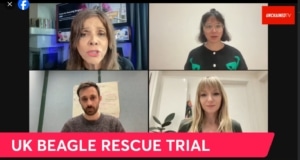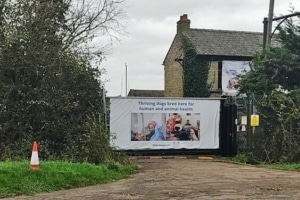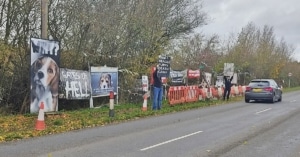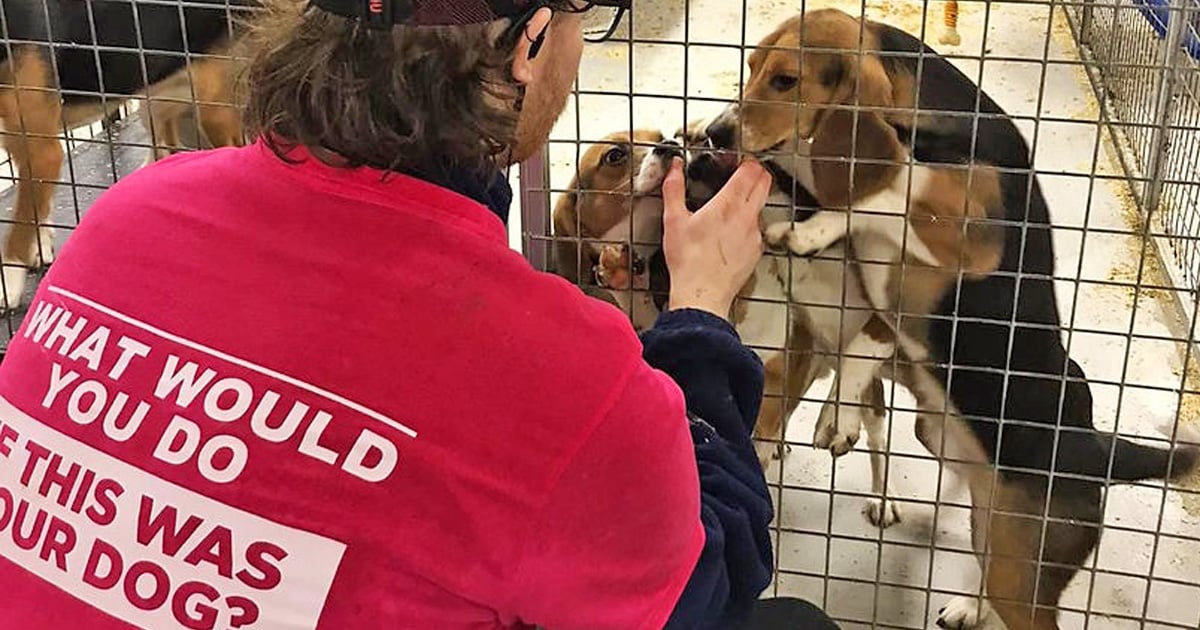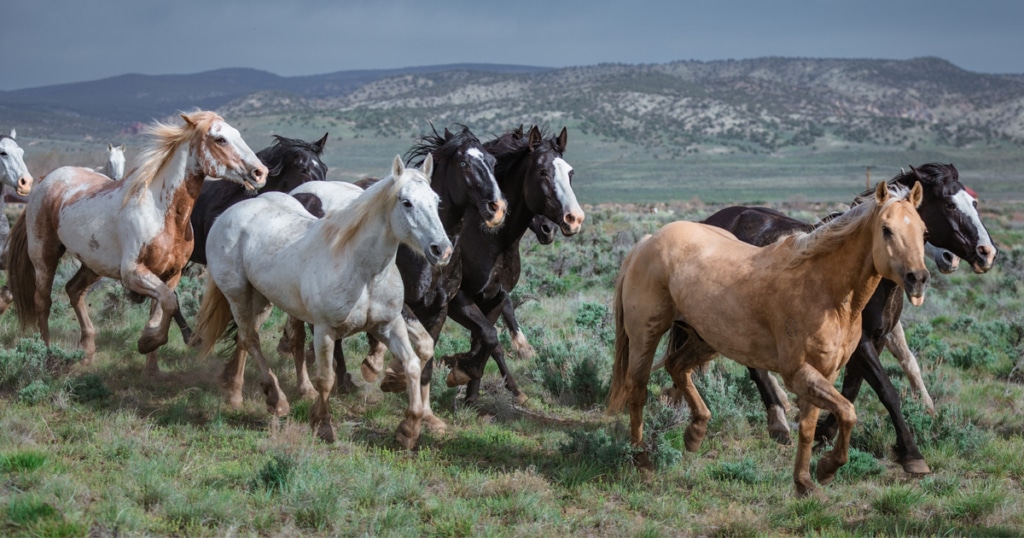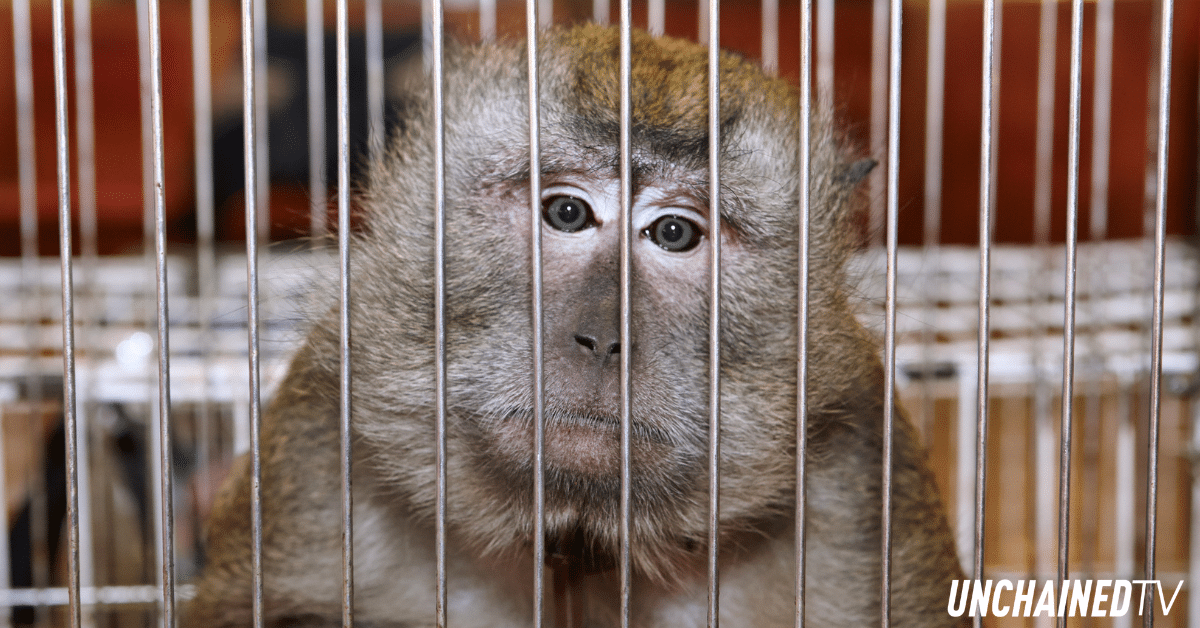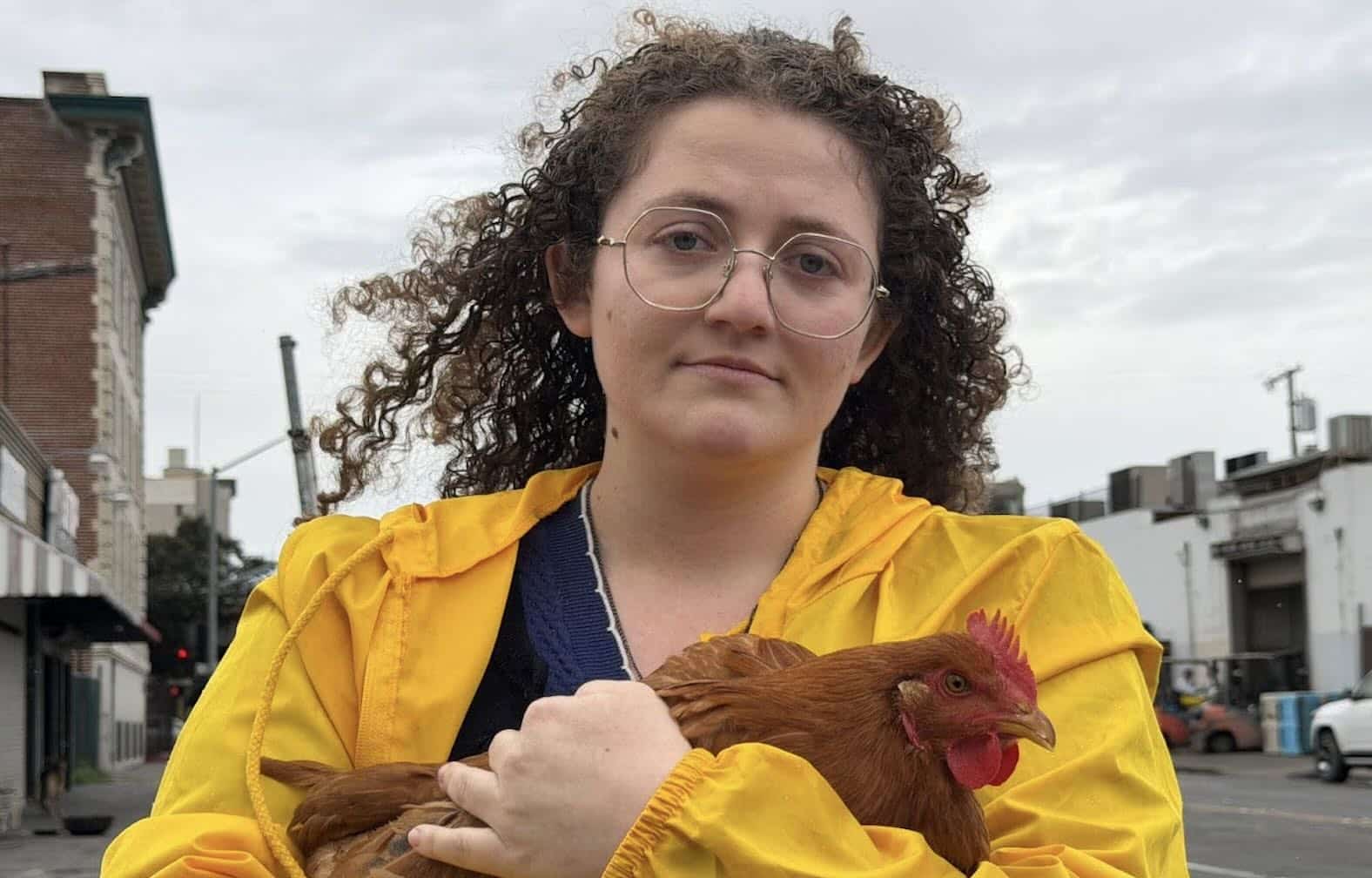[Speaker 4]
Alright, everyone stick to the plan. Alright, in, in, in, in, in. Evan, this one!
[Speaker 1]
Welcome to our preview of the upcoming December 1st 2025 United Kingdom Beagle Rescue Trial. Unchained TV is extremely proud to be covering this live from the United Kingdom. We will have a reporter outside court as the trial unfolds.
And right now we’re very honored to have some of the key people who have literally put their lives, 10 years behind bars, potentially, to rescue these beagles. I want to start with Ben Newman. You saw him there on that video.
Ben, you along with Rose Patterson, who’s also here, co-directors of Animal Rising. Tell us why you did what you did. What is your message for England and the world?
[Speaker 2]
Yeah, thanks for having me, Jane. Actually, I haven’t seen some of that footage for ages. That is pretty wild.
So we took beagles, 20, 23 beagles over two rescues in 2022 out of MBR Acres. It’s a puppy breeding facility where they’re breeding 2000 puppies to go into animal, to be sent for animal testing. And we’re calling for the facility to be closed.
Long story short, and put animal testing. Originally, the concept of animal testing on trial, because we actually, I did it once in June 2022 with three of us who did it accountably. And then the Crown Prosecution dropped the charges, they said, due to lack of evidence.
So then we went back again in December 2022. And so what we’re hoping is that we’ll be found by, obviously, it’s not guaranteed, but hoping we’ll be found not guilty by a jury. And then, yeah, and that will significantly, hopefully undermine the animal testing industry in the UK.
[Speaker 1]
Well, I just want to say personally, as one human being to another, I don’t understand how you’re so cool, calm and collected about facing the prospect of a decade behind bars. Can you give us some insight into that? Like, you know, a lot of people would be like, oh, my gosh, yes, I love beagles, but I’m not willing to go and spend a decade behind bars.
[Speaker 2]
Yeah, I think we’re all quite positive people, but so it’s going to have a trial with the jury. So they’re going to have to convince 12 random members of the public that saving puppies is a crime. And so the hope is that we don’t get found guilty.
But if we did, if I did and got a small prison sentence, yeah, I mean, it wouldn’t be great getting a prison sentence. But if it was short, if it was just a few months, that could be OK. It would be pretty.
It wouldn’t be. Yeah. If it was longer, that wouldn’t be great.
But, yeah, I guess we’ll see. We’ll see what happens. I don’t know.
I’m not too worried about it at the moment, to be honest. I’m quite hopeful. It seems so common sense.
The practices we’ve been doing for the trial, for example, explaining why we did it just seems so natural and easy to explain. And I’ve done so much. We’ve done some wild and maybe even at least I feel I’ve done some stupid things in activism in my time.
But this isn’t one of them. So even if we get found not guilty, you know, I don’t regret it. Wow.
[Speaker 1]
Pretty extraordinary. I want to play a little bit of footage of what you say are the conditions. Well, this is just videotape of the conditions inside the facility.
And let’s discuss on the other side. All right.
[Speaker 4]
I’m heading this way.
[Speaker 1]
I’m going to.
[Speaker 4]
It’s all right.
[Speaker 1]
I’m completely nonviolent.
[Speaker 4]
I’m not going to hurt you. God, I’m in the building. Hello.
[Speaker 1]
All right. So Rose Patterson, you are also a co-director of Animal Rising. And correct me if I’m wrong, because there’s five trials involved here.
This is rather complicated. You are also going to be going on trial in the future over the same event. Why you why are you risking a decade behind bars?
[Speaker 3]
Yes. So, yes, a little bit confusing. So there’s 20 of us going on trial over a period of about three or four months.
So, yeah, Ben’s in the first trial that starts on the 1st of December. And we’ve been split into groups of four or five. And mine’s the fourth trial.
So my trial is in February. And yeah, the reason I did it. Well, we knew the risks going into this.
I guess it was quite a personal thing for me as well. So when I was a child, I learned about animal testing because one of the animal testing labs that beagles still go to today is in my hometown. And so I learned about that when I was really young and always wanted to buy animal testing.
And so, yeah, in 2022, there was the opportunity to to go into NBR acres and do this. And, yeah, of course, to save those individuals that we did, those 23 puppies. I think that in and of itself is a really, really good thing.
But also we did this openly and accountably and we wanted to go to trial to raise awareness about what’s happening to beagles in animal testing labs still in the UK. It’s just like completely barbaric that this is still happening when there are alternatives. The government’s actually trying to phase out animal testing now.
And yeah, I just cannot stand the thought of animals being tested on in this day and age. And so, yeah, I felt I’m totally happy to put my freedom at risk for saving some lives. And I think this is the first open rescue trial ever in the UK.
So it’s a historic event and just a huge moment for the animal movement to draw more attention to animal testing and hopefully see the closure of NBR acres very soon as the first step in ending all animal testing.
[Speaker 1]
Well, we want to say that we invite the company on any time. We’re happy to dialogue and I want to get your response. We’re going to go to the attorney who is here.
She doesn’t work for Animal Rising, but she’s a legal coordinator who supports Animal Rising. The company has called the activists extremists. They say they stand by their work and they say they’re in compliance with all regulations.
Maybe a quick round. Robin, what’s your reaction to that? Yes.
So the so the Animal Scientific Procedure Act is the statute that regulates animal experimentation in in the UK. And it seems quite odd that that they are saying that they’re compliant with regulations because they are not releasing their agreement with the secretary of state. That that and this and this agreement needs to be approved by the secretary of state in order for them to take part in the animal experimentation industry.
So the fact that so the fact that they aren’t releasing this agreement like only only shows that they have something to hide. Well, again, we invite them on any time you’re looking at these dogs in these cages. One of the reasons they choose beagles is because beagles are very docile and are known for being very easy to handle and very lovable.
Frankly, people love their dogs. Americans love their dogs. The people of England love their dogs.
Dogs are beloved around the world. And I have to say, it’s kind of personal for me because I have a beagle mix here by the name of Wednesday, who is my daughter, my third daughter. And the idea of somebody cutting up her skull or doing toxicology tests on her, it’s absolutely unthinkable.
And then the the surveys, the polls show that the overwhelming majority of people in the United States and in England are against this kind of testing. And there’s also evidence, which I’d like to hear from you, that it’s ineffective, that there are more modern methods in the 21st century. Why is this continuing?
And that applies to the United States as well as England. Although I have to say that very recently, the National Institutes of Health here in the United States has begun really pushing organs on a chip and some other modern methods that are that are more accurate.
[Speaker 2]
Yeah, I just say, sorry, just on the beagle cuteness, Jane, I just say when we took the beagles out of how lovable they are, even though they’d been in these concrete pens for their whole lives, running through the fields with the beagles, they’re like the most calm, almost buddha-like calmness running through the fields and licking your face. Yeah, they’re ridiculously cute. But why are they doing it?
I don’t know. It’s a little bit of the toxicology tests in particular, where they test, they test, they test on, they feed dogs drugs until they die or get seriously sick. It’s just a rubbish and unscientific test.
It’s likely because we often talk about it because it locks out competition, because it’s incredibly expensive to do dog, to do animal testing for big pharmaceutical companies. I suspect that’s part of the dynamic. But yeah, I don’t know.
I don’t have a great answer to be honest.
[Speaker 1]
Well, what we’ve found here in the United States is follow the money. It’s a big industry and the universities support it because they get a cut. And also these grants are often just out of tradition, habit, awarded to how many animals does it take to have 50 percent of the animals die for this drug?
You know, the LD50 test, as it’s called. So there is this financial incentive in general. And then there’s also the universities that get a cut.
I would think it’s probably very similar in the United Kingdom. But is there a move away from it? I mean, is this the moment in time?
Because until very recently, the National Institutes of Health in the United States was completely blind, deaf, dumb to the concept of coming up with alternatives. And very, very, very recently, just in the literally last couple of months, there’s been a sea change where now they are funding programs to look at, for example, organs on a chip and other high tech methods that don’t involve using animals, Rose.
[Speaker 3]
Yeah, I think it’s actually perfect timing that we have the trials coming up. So just last week, the UK government released a manifesto on how they’re planning on phasing out animal testing. It’s still a little bit wishy washy.
And the dates are a bit unclear. There are some things that they’ve committed to phasing out by 2013 and 35. And there seem to be some loopholes where it says in exceptional circumstances, animals could still be tested on.
But in that manifesto, it literally says that the alternatives to animal testing are usually just as good or better than testing on animals. So, yeah, the science is backing up what we’re saying as well. So I think we’re moving in the right direction.
It’s still too slow. And I think we have a good chance of seeing a shutdown of MBR and other breeding facilities in the very near future. So, yeah, I think it’s the perfect timing that this is all happening right now.
[Speaker 1]
And now this video is extremely dramatic. Here it is, the team going in. Can you give us a play by play, Ben, of how this was accomplished, the extraordinary amount of planning?
And, you know, just how did this unfold?
[Speaker 2]
Well, I’ve never done base jumping, but I imagine it gives you a similar amount of adrenaline. It was one of the most insane experiences, I think, of my life. I’m sure Rose feels the same.
It was just absolutely crazy pandemonium. But I don’t know if I want to be the planning for it. Well, I don’t know.
Do I want to be on anything? Well, you can’t share out everything.
[Speaker 1]
I’m not asking you to share anything.
[Speaker 2]
Maybe that’ll come to us. What do you reckon, Rose?
[Speaker 1]
What was it like going in here? I mean, I got, look at you, jumping over a fence like that. You know, this was something out of like a James Bond movie.
[Speaker 2]
Yeah. So there was training. We were doing training before.
But we were doing training in the months leading up for it. People came in. We came in from two sides at the same time.
I don’t know why I was using an angle grinder. That was not a good idea. So, yeah, people like piling over fences and people crying, screaming, security trying to grab and scream, grab dogs off people, people running through fields with police chasing them, trying to get the beagles back.
Yeah, that ended up, there was a crazy police video.
[Speaker 1]
I’m trying to line this up and I added it up too quickly. But I want to say that there were two, you rescued 20 dogs. Two dogs somehow got returned or taken by the authorities.
And then they were returned to the company. And that created a lot of outrage. A lot of celebrities spoke up and said that either they would take the dogs.
Why is this happening? And I want to play add to the stage high tech. So bear with me.
Sometimes it doesn’t work out.
[Speaker 2]
Animal Rebellion are very peace loving. And their point is they will take themselves to court. They handed themselves in, by the way, after they gave the beagles to safety.
They handed themselves in. They want to go to a public jury. I believe in the public.
I started my career from believing in the public. Who would have thought a gay, posh 22 year old would have been given a record contract? No one.
But I believed in the public, even if record companies didn’t. And openly gay, posh, not very cool politics students. But I believed in the public.
I always have done. And I know the public. Because I’m part of the public.
[Speaker 1]
OK, so I can’t do too much of that. I just wanted to show a snippet of it. But the point is that that celebrity tell us about him and why.
And that was an exclusive interview. I get the the organization. Give him a shout out for getting that exclusive interview.
But why are these celebrities speaking out? And the points that he made, I thought, were very interesting. First of all, he’s saying he has confidence that the public is going to acquit you.
Secondly, he pointed out that you turned yourself in. Tell us about that, Rose. Tell us about the fact that you didn’t not only not hide from the public, you videotaped yourself doing this and then you turned yourself in to law enforcement.
[Speaker 3]
Yes. So so for context, the guy that was just speaking, that’s Will Young. He’s super famous in the UK.
He was the winner of Pop Idol back in. It was like the first ever Pop Idol in the early 2000s or something. And so, yeah, he’s like a national treasure.
Everybody in the UK knows him. And he’s also chained himself to the himself to the gate of MBR Acres as well. So, yeah, he’s totally on side with us.
And he was he was speaking. Yeah, this was after Love and Libby. So the two puppies that had been taken by police.
So while I was running across the field with one of the puppies in my arms, police actually caught up to me. And I was like on the ground trying to protect this puppy. And, yeah, there was basically nothing I could do.
And so, yeah, the police took me and the puppy away. And then they also caught one other puppy as well. So we successfully rescued 23.
And then there were two, Love and Libby, that were taken by the police. And, yeah, they eventually went back to MBR Acres. But there was always a public outcry.
Will Young and others were calling for those two beagles to be freed. So I think it’s like really positive that we’re seeing that celebrities and the public are supportive of our actions. But yet on your question about filming ourselves and doing this accountably, not covering our faces, going and reporting ourselves to the police.
This is part of the strategy or tactic of open rescue. So, yeah, a lot of the time. I mean, I don’t think there’s anything wrong with rescuing animals from facilities and covering your face.
That’s great because lives are being saved. But there’s also when we’re up, when we are open about this and we’re talking like we wouldn’t be here right now talking to you, Jane. If we weren’t completely open about it.
And it’s about both rescuing those beagles lives and also drawing as much attention to this issue as we possibly can. And I think when the people when the public see people sacrificing a lot, like sacrificing their potential freedom to rescue beagle puppies, I think that inspires people. I think it moves people.
And it shows that this is like something serious that people are willing to risk their lives for. And, yeah, I think it’s just so inspiring when I look back at other social movements and the risks that people have taken. Those are the things I remember.
And so, yeah, it’s all about drawing attention to this because, yeah, we can’t talk about what we’ve done unless unless we’re open about it. And everything we do is rooted in nonviolence. And one of the core principles is doing this accountably.
And I know I did the right thing. I can 100 percent say I did the right thing by entering that facility and taking those beagles out of there. And it’s up to a jury to decide whether that’s a crime or not.
It’s not automatically illegal.
[Speaker 1]
Well, once again, we’re going to be covering this trial on Shay TV. We have a reporter who’s going to be outside court on December 1st. So please join us for that.
And, of course, here in Los Angeles, where I’m at, it’s 10 in the morning or a little bit after. And in England, it’s 6 p.m. So we’re going to be in the morning and we’re going to get what happened in court that day because it’s going to be evening time. By the time that the in the in the time difference, it’s going to be evening in England.
So we’ll know what happened for the whole day and we’re going to be covering key moments of the trial. What are the legal arguments here, Greta? First of all, we’ve seen prosecutions here in Los Angeles, in California, where just recently.
And we’ll get into that. There was a conviction for an open rescue. But you’re on tape doing this, presumably.
What is your defense?
[Speaker 4]
Yeah. So England is probably the greatest country on Earth to rescue animals.
[Speaker 1]
So if anyone wants to do an open rescue, come to England. And one of the reasons for that is that any of the urgery or theft charges on the prosecution has to prove that the defendants acted dishonestly. And so basically, like one of the defendants, like as long as the defendants prove that like they did not act dishonestly or essentially that or essentially that their actions were honest, then then the jury is able to acquit them.
And really what honesty means is that is that is that the jury will be asked to take into account the facts and the information that the defendants had prior to the rescue. And then and then they will be instructed to assess that to the standards of an ordinary and decent person. So as long as and so as long as the jury believes that that any ordinary person would want to rescue an animal who is being abused or severely harmed, then they have reasons to acquit.
OK, I’m going to ask sort of people terms, Ben. That was a good legal explanation. But in people terms, what is your defense?
[Speaker 2]
That I behaved honestly, that a normal person would think it’s OK. It really is what a normal person. Would a normal person think it’s OK what we did?
And have I been honest through the process? I’m going to be open about our intention, my intentions. In fact, I’m bringing my mum.
This is as a defence witness, character witness. My mum is actually going to come just to say, like, I’m a normal, ordinary person. And it was quite an extraordinary day.
But pretty much every anyone and everyone I’ve spoken to about it thinks it was fine and supports it. So that’s basically the defence is I rescued a puppy. I don’t see like I did anything wrong.
And they’re now living happy lives.
[Speaker 1]
So it’s OK.
[Speaker 2]
It’s really the legal legal defence.
[Speaker 1]
So playing devil’s advocate or thinking about what the prosecution might say, unfortunately, or, you know, just looking at the law, animals are considered property. And so the prosecution is going to be saying you stole these animals, their property. What is your response to that?
[Speaker 2]
It’s that the dogs are living, living in terrible, likely illegal conditions. I’ve seen the conditions with my own eyes and I did what an ordinary member of the public would consider a decent thing to do and took those dogs out of harm’s way and for them to live happy lives. That really is that really is the defence.
And they’re going to frame you. The main thing they’re going to try and do is frame you as not an ordinary, decent person that you are like some sort of thing that I mean, other people in trial are dangerous radicals, maybe, or that we we get our values aren’t in line with the rest of the British public. But that’s what they’re going to try and do.
They’re going to try and discredit it or say that you’ve intimidated staff would be another thing that you’ve behaved in a scary, non-fair way. But we were quite respectful to the staff as well and actually spoke with them for hours because we were waiting around to be arrested. So these are the kind of defence.
You know, they’re going to try and discredit you as a person and that you’ve behaved. That’s that’s really what they’re.
[Speaker 1]
Yes.
[Speaker 2]
Yeah. I must say, I’m feeling the more I talk about it, actually, Jane, I’m talking myself. I’m talking myself into feeling very confident about it, actually.
[Speaker 1]
Well, the law is very different, obviously, in the United Kingdom than it is in the United States. And while we’ve had acquittals in open rescues, we’ve also had convictions. So I’ll do a little recap of that.
Now, when Wayne Shung went into and I’m just bringing it up here, I went into a pig factory farm and he defended himself in court. Wayne Shung is a constitutional law professor and he was acquitted. And that was a huge plus for the animal rights movement here in the United States.
More recently, Zoe Rosenberg was facing, you can see, one felony and several misdemeanors for an open rescue that she conducted. Here is the open rescue in progress, just as you did. She videotaped her organization, Direct Action Everywhere, videotaped themselves rescuing chickens from this slaughter truck.
And she was put on trial. And just recently, she was convicted. And in fact, a couple of days after your trial starts, she is going to be sentenced.
And we don’t have any idea what her sentence is going to be, but she could do up to four and a half years behind bars. So one of the things that she tried to argue was the necessity defense. And she said, essentially, it’s the law says it’s OK to break a small law like trespassing if you’re preventing a greater evil like the death of an individual.
And the classic example would be somebody who sees a child drowning in a swimming pool, jumps over the fence, goes onto private property, and then rescues the child from the swimming pool would be hailed as a hero. Unfortunately, the judge ruled that the necessity defense does not apply to non-human animals. So I’m bringing this up because I don’t know if in England the idea of the necessity defense is something that comes up.
Maybe you can give a shot at it, Greta.
[Speaker 3]
Yeah, so the necessity defense hasn’t been tried yet in an open rescue case in England, from my knowledge.
[Speaker 1]
But it’s like also because you don’t need to try it here because you already have the defense that you did not act dishonestly. And this is, in some ways, brings in the same facts and evidence and information that you would be bringing in anyway if you tried to argue in the necessities offense into this trial. So essentially, there’s really no need to try to argue in England.
[Speaker 2]
We did actually have that. I was just going to say we did actually have all those defenses in our defense statements originally. We were going to bring necessity and that they would have consented and a few other defenses, but we actually removed them all to keep it simple.
There were a few other like what we considered to be much weaker defenses. Yeah, necessity was going to be one of them. But we were putting forward just the very simple dishonesty, the honesty defense.
So, yeah. So we did have them before, but we decided to not go with them because we think it’s so simple.
[Speaker 1]
Yes. And before I forget, I want to say thank you LBC for that interview. We used a fair use clip of Will Young speaking in favor of what you did and condemning the police for returning two of the Beagles.
Where, Rose, are the Beagles now? The 18 that you rescued, two went back, but 18 were rescued. Where are they now?
[Speaker 3]
It was a total of 23. It’s confusing. So it was one rescue where there was 18 and another rescue earlier in the year where there was five.
And then there’s another two that are separate too. But yes, a total of 23 are all living happy lives in their forever homes. You can see photos of the Beagles there.
But yeah, I personally don’t know, like none of the rescuers know exactly where they are for their own safety. So that I can genuinely say that I don’t know where they are. Well, yeah, after the first rescue and probably after the second as well, the police did try to find them.
And yeah, they actually went to quite great lengths to try and find the Beagles. So yeah, for their own protection, none of us actually know where they are. But yeah, we worked with friends to help rehome them.
And yeah, so they’re all in loving homes now. And yeah, we occasionally get videos sent to us of the Beagles running around in gardens and things. And yeah, it just makes me happy to know that, yeah, they’re somewhere out there.
And every time I see a Beagle actually on the street, I’m like, oh, that could be one of the Beagles that we rescued. But I’ll never know.
[Speaker 1]
And I just want to point out that there is a petition. If you look at the QR code and take a picture of it or just put your cell phone camera on that QR code, you can go to the petition that you can tell me what this petition calls for. It’s already gotten more than 32,000 signatures.
Tell us a little bit, Ben, about what this petition calls for.
[Speaker 2]
So it’s calling for MBR Acres. So MBR Acres is a Beagle breeding facility. So it’s freeing the Beagles and for them to all be rehomed.
That’s what we’re working on. I think this is actually, yeah, so it’s quite simple. Yeah, because there’s 2,000 dogs in there and it will give them all new homes.
So that’s what it’s going for.
[Speaker 1]
Now, let me ask you a question. You guys, gals, you folks, the level of confidence you feel is really extraordinary. But what does the prosecution have up its sleeve?
The reason I ask that is that here in the United States, after some acquittals, we already spoke about the fact that Wayne Chung was acquitted in the piglet rescue trial. Then there was this rescue trial. This is an open rescue of chickens from a slaughter-bound truck.
Two people, including former Baywatch actress Alexandra Paul, you see her there running, again, they videotaped themselves, they rescued two chickens, they were put on trial, and they were acquitted. And again, this was considered a huge victory for the animal rights movement. Alexandra Paul, famous actress, that’s another factor, I’m sure.
It’s very hard to convict celebrities. I’ve covered a lot of celebrity trials, so I can say that with assurance. It’s a harder thing to do.
She also took the stand and spoke in her own defense. Let’s listen to that for a second. Open rescue is going into facilities where there’s animal abuse and documenting that animal abuse and rescuing the animals who need medical care.
And that’s the rescue part. And then the open part is that we don’t cover our faces. We are completely transparent about what we’re doing, because that’s an important ethic to us, and because the companies that we’re investigating are not transparent, and also because we believe that what we’re doing is legal and right.
Now, she was acquitted. What happened was that the prosecutors here in California, and this is my speculation, took a look at that and they said, uh-huh, we better change our strategy. And instead of charging Zoe Rosenberg with theft for rescuing the chickens, the four chickens, they charged her with conspiracy and then some underlying misdemeanors.
And they were successful in that. So, are you concerned at all that the prosecutors in England might be coming up with some kind of strategy? I know the charges are fixed right now, but some kind of strategy that you haven’t anticipated, Ben.
[Speaker 2]
Well, our judge actually explicitly asked the prosecution if they’re going to throw in some random, throw in some different charges like criminal damage or conspiracy, and they indicated they wouldn’t be changing the charge, which is quite interesting, actually. Our judge, I think they may have changed now, but it’s incredibly sympathetic. This is the strange experience with all the Beagles process so far.
Everyone from the judges to the court staff are incredibly sympathetic. But in answer to your question, no, but they have done this. They might do this.
They have done this in previous. Because we’ve had quite a lot of court cases with horse racing and stuff in the past, and they have done similar things. Yeah, and I suspect they’re going to learn a lesson from this.
We keep thinking that they might end up dropping it at some point, because I’m struggling to see how they could be reasonably confident they’ll get a conviction, but we could end up getting one anyway. Yeah, so they might change it. They might change it.
[Speaker 1]
Again, if you’re just joining us, you’re watching the person that you’re listening to, Ben Newman, right there, cutting into a fence and going into a facility that breeds Beagles for laboratory experimentation. And some of that experimentation includes toxicity tests, painful tests. These animals do suffer.
You can say that with assurance. And a lot of them ultimately are killed. And there is a growing cultural questioning of why this is happening when we’re in the 21st century, and there are high-tech methods, organs on a chip.
And, Ben, while I have you, can you talk a little bit about your argument that animal testing is simply not effective and is wasting taxpayer dollars in many cases when that money could be used for more advanced science?
[Speaker 2]
Yes, most of most of these Beagles are being used for toxicology tests, which is just feed them 50 percent. You know, what does it take to kill 50 percent of the Beagles? And the only reason they’re actually using them is there is a requirement for many toxicology tests.
They’re tested on two ran to two random mammals. And Beagles of interest ended up being one of those mammals. And it’s been going on for the last 60 years or so.
Yeah, I mean, that’s like that’s that’s an advance of the science gets the toxicology tests. And there’s like plenty of alternatives now. So that’s certainly one of the first ones to go.
But aside from that, though, I just I just I just even if even if even if it wasn’t, even if it was still effective doing toxicology tests like that, it just there can be no. It’s just something like straight out of hell that poisoning, poisoning puppies. So, yes, that’s part of me, which doesn’t want to get like I agree.
Like it’s bad science, but it’s just like so, so sort of such a cruel thing to do. I just there can’t be a place for it anyway.
[Speaker 1]
Well, you know, we in Western society, we have a tendency to think of ourselves as animal lovers. And of course, we condemn, for example, this is the dog trade in Asia. And there’s something called the Yulin dog market.
And of course, of the overwhelming majority of people in Asia opposes 100 percent. This is another dying tradition. But, you know, in the United States and Europe, people are out, you know, screaming at the top of their lungs.
Oh, my God, this horrible tradition. And yet we seem to ignore our own cruel traditions, which have a tendency to happen behind closed doors, whether it’s factory farming, whether it’s animal experimentation, breeding animals for torture in the lab. Rose, are we in a culture war right now?
Is that how you would describe it?
[Speaker 3]
I don’t know about a culture war, but I think you’re right. A lot of this is happening behind closed doors. And most people in the UK just have no idea that dogs are being tested on anymore.
I think a lot of people don’t think much about animal testing. And especially with with MBR acres and testing on dogs, it’s just not widely known. And whenever you tell anyone about what’s happening at MBR acres and that dogs are getting tested on, I think every single person I’ve ever spoken to about it is shocked.
And yet majority of people just do not know. And yes, I think it is just because, yeah, there’s lack of awareness around this. And that’s one of the reasons we decided to do this, is to draw more attention to it and to help put more pressure, gain public support, put more pressure on MPs, the government to to make changes that are needed.
So, yeah, I think the key thing is that it’s just somehow gone under the radar for so long.
[Speaker 1]
Well, let me say this as well. It’s a consumer issue, too. And I personally do my utmost to avoid purchasing anything that doesn’t have the leaping bunny from PETA or some other clear indication.
There’s only about three. And I would always say beware, because especially with cosmetics and beauty products, people love to say it’s cruelty free. Oh, it’s cruelty free.
You go into a hair salon or whatever. Oh, yeah. They’ll just say it’s cruelty free.
But you have to look for that leaping bunny. And I will say, as an aside, I have saved so much money over the years by going cruelty free because a lot of the beauty industry is a giant scam. And, you know, you can you can put coconut oil on your hair and have the same impact as buying some product for 50 bucks that is basically achieving the same result, but torturing animals in the process.
So we have the consumer responsibility to look and make sure they’re not buying. Because one thing people don’t realize is that it’s extraordinary how many mainstream products are tested on animals. And that my understanding is when something is new and improved and they put that new and improved label on something, which is something that companies do quite often to encourage sales, that a lot of times that new and improved requires new animal testing.
But I will also say that and I’m not an expert on this, so I’d like to get some information from you that the United Kingdom is and Europe in general is more advanced when it comes to eliminating animal testing on a wide variety of products than the United States. Ben or Rose?
[Speaker 3]
Do you want me to answer that one, Ben? Yeah, I think it’s Rose. Well, yeah, because I think for a long time I’ve been keeping an eye on animal testing and cosmetics because, yeah, from a young age I was avoiding products that were tested on animals, including household products and beauty products, cosmetics and stuff.
So, yeah, in the UK and the EU, animal testing is banned for cosmetics, although there are some loopholes. Like if products are made in the UK or the EU but sold in China, they may have to be tested on animals. But generally there’s like a ban on cosmetics testing on animals.
So I think that’s also probably one of the reasons why people don’t realise that animal testing is still happening in the UK. And yet people hear that there’s a ban or that people think it’s more justified for science. But yet, of course, there’s still toxicology tests that are happening for household products and things like that, too.
So, yeah, we’re, I guess, probably more advanced than the US in that sense. And the fact that we’ve already released a plan to phase out animal testing is great. But, again, there’s always loopholes or it’s always extremely slow.
[Speaker 1]
Yeah, and people are pointing out cleaning products as well. Absolutely. You know, we all know that a lot of these products that people push, that companies push, are completely unnecessary.
Soap and water, which you can get cruelty free, can eliminate 99.9% of all bacteria and household germs. But the whole point of a consumer society is to constantly come up with new products. So what is your best hope, Ben, for the outcome of this trial in terms of legal change, in terms of cultural change?
[Speaker 2]
Well, I think that it’s a two part. We want to win the trial and we want there to be to explode into a national news story. I think that’s quite an important part.
And so we’re actually it looks like the BBC are going to be following coming for the first day of the trial at least. So I and I think this is and then combined with that, it finally because it’s really hard to get animal testing to blow up into the press. So we previously last time we did this there, it was very dodgy, actually, how the one of the journalists who covered it, he was being hounded by his editors the next few months and nearly got pushed out of the organisation for covering animal testing.
So it gets very funny. Animal testing is obviously like a national news story worthy event. We’ve done other things which have blown up nationally several times and it’s definitely met the bar of anyway.
So we hope for it to explode. And then NBR Acres, which is definitely on its last legs. There’s been pressure campaigns, for example, none of the suppliers will supply NBR Acres, this beagle breeding facility anymore.
So we hope that this could be the final nail in the coffin, which would be a great first step to ending animal testing in the UK, because it’ll create a sense of sense of momentum and the feeling that we can actually win, which is really important for getting anywhere.
[Speaker 1]
Yeah, and I’ll say this over and over again, we invite the company on any time we’d like to get your response to their reaction, which was we are compliant, they say, with UK regulations and laws and calling you extremists. What’s your reaction?
[Speaker 2]
Yeah, I just think the jury is going to be able to make their mind up on that one. The dogs are like living in concrete pens, walking around in circles. It’s a completely the whole organisation is just completely dodgy.
So I don’t know, I just my view is pretty obvious. And yeah, animal testing is not needed. And yeah, and I think a jury is going to be able to see through this.
[Speaker 1]
Let’s talk a little bit about the trials. It’s taken me a while to try to figure this out. How many trials and why are you being tried separately?
I guess because there’s only so many people you can fit in a defence table. How many people all told are going on trial? I know your trial, Ben, starts December 1st, but Rose, you’re ultimately going to go on trial too.
So can you spell out how this is going to unfold? Because Unchained TV is going to cover it to the best of our ability starting on December 1st. And we have a reporter who’s going to be outside the court in Cambridge bringing us the latest.
But you’re going on trial, Ben, December 1st. But Rose, you are also going on trial for the same, correct me if I’m wrong, the same incident. What we just saw on camera there, but you’re not going on trial until months later.
What’s that all about?
[Speaker 3]
Yeah, so yeah, you’re right. It’s basically because there are 20 people in total that are going on trial. And yeah, they just they don’t have a courtroom big enough for all the defendants.
So that’s why this splits up into smaller groups. So yeah, like you said, Ben starts on the 1st of December. Each trial they think is going to be roughly two weeks.
Sometimes it may end up getting a bit longer. And so there’s two weeks in December. The next one starts in January.
There’s a third one starting the end of January. I’m actually on another trial for rescuing lambs from King Charles’s estate the beginning of February. And then I go on trial for beagles towards the end of February.
And then there’s one final one in March. And so, yeah, it’s possible for different outcomes from different trials. So even within the trial, Ben could get found not guilty, but Nathan could get found guilty.
So, yeah, there could be totally different outcomes for individuals and individual trial groups as well. So, yeah, if anyone is found guilty, it’s possible that all of the sentencing will happen after all of the trials are done as well. So, yeah, it’s a really, really long process.
But it’s also an opportunity to keep it in the media for a long period of time as well.
[Speaker 2]
Well, you know, yeah, go ahead. Another thing that might happen, though, is because we just got a big trial. People might have seen the Grand National Horse Race disruption that we did in 2023.
Anyway, the first three trial groups have been found not guilty, hung jury, they’re not guilty. And then they’re considering dropping the whole case and all the future trials. So what might happen is if we win the first couple of trials, the prosecution might just tap out and drop the rest of the cases as well.
So if we start winning them, that’s one of the outcomes that might happen. They’ll just give up.
[Speaker 1]
I could see that happening because this is costing a lot of money. And what really blows my mind in a bad way is like how much money is being spent to prosecute you guys. Can you address that, Greta?
[Speaker 3]
I don’t have exact numbers, but it’d probably be around 10,000 to 15,000 pounds would be my guess.
[Speaker 1]
No, I mean, look, if you think about the courts and the police and everything else, they’re spending probably millions of dollars, tax dollars. The money that people pay in taxes to prosecute you, just like they’re prosecuting people here in the United States. When the overwhelming majority of people are against animal testing, to me, we can talk about individual companies, but ultimately, what’s the government’s responsibility?
Let’s face it, here in the United States, and I’m sure it’s similar in the United Kingdom, it’s the government funding a lot of these animal experimentation. It’s the government requiring certain animal experimentation, and then it’s the government prosecuting people who go in and rescue these animals. So we’ve talked a little bit about consumer responsibility, because if everybody in a perfect world, if a miracle occurred and everybody on the planet Earth said we’re no longer going to buy products that are tested on animals, that would reduce animal testing radically, even though there’s some obvious so-called scientific research for medical advancement.
So there’s the consumer responsibility. There’s the corporate responsibility. Companies could go 100% cruelty-free.
And then there’s the government. And what I’ve seen covering these cases is a lot of times it’s the government that keeps this going. The government that has been co-opted by industry that continues to fund something that is outdated.
What are your thoughts on that?
[Speaker 2]
Ben? Well, I would say this case, I keep every day getting posted another inch thick of more paperwork and investigations that they’ve done. So they’ve done a massive, just on the cost of it and how much energy they’re putting into it.
This is by far the most organised they’ve ever been in a prosecution that we’ve seen for this type of trial. They’ve searched everyone’s, they’ve searched all kinds of houses, pulled everyone’s phone records, everyone’s GPS. So, yeah, so they really want to actually get a conviction on this because I think it’s just like a massive humiliation.
It’s a bit unclear why they got. I honestly. Yeah, the whole the whole animal testing industry is quite strange, but that’s because it is the historical factor, because it nearly got squashed, the animal testing industry in the early 2000s from pressure, from pressure campaigns, from Shack, from the early 2000s.
So the government are very cagey when it comes to animal testing. So I mean, I don’t. Yeah.
So, yeah, they are taking it seriously, but I don’t really know what’s going to, because I think they’re worried it’s going to be quite embarrassing if they lose. So I haven’t got that much to add to it, to be honest, Jane, I just think they’re going to embarrass themselves. I’m getting overconfident again.
People keep telling me not to get overconfident on this one.
[Speaker 1]
Well, yes, what they say, hope for the best, but prepare for the worst. I just want people to listen to what it’s like inside these facilities. I mean, we experienced 27 seconds of it and it’s already creating stress.
What’s it like, Rose, for for these animals living? And this is before they’re sent to be vivisected on.
[Speaker 3]
Yeah, they you can actually hear the sounds of the puppies barking from I’ve been outside multiple times. So you can kind of like walk around the perimeter of the whole place and you can hear the puppies from outside. So, yeah, it wasn’t just because we were there that they were all making this noise.
Like it’s quite normal to hear them all. Yeah. I mean, it’s just like constant, the sound of those puppies.
So, yeah, it must be pretty stressful for them to be in that environment. Obviously, they’re frustrated. I mean, I’m sure like, yeah, they’re also like barking and playing and things like that.
But I think a lot of the time they’re also I mean, yeah, it must be so boring for them just living in this like concrete cell. And with basically no enrichment, nothing to play with. And yeah, it’s it was stressful for me.
I remember when I first went into that shed and it like hit me like the sound and the smells like hit me straight away. Yeah, it’s not actually just the sound. It’s the smell in there.
It stung. And you could see in the video as well. There’s a lot of like excrement all over the floor, too.
And it’s just clearly those conditions are not suitable for dogs to be living in. Anyone can see you don’t need to be an expert.
[Speaker 1]
Rose, I just want to ask you, because you are so cool, calm and collected. I think I’m more nervous about this trial than you are. How do you stay so calm?
How I don’t I mean, I have the greatest respect for people who do undercover investigations, who do open rescues, because of the courage that it requires. But now you’ve not only done that, but you’re facing trial. The prospect of possibly 10 years behind bars, both of you.
And yet it’s like another day at the office. I would like to get into your head and understand how you are staying so cool, calm and collected. And I think our viewers would be interested as well.
[Speaker 3]
I guess it is another day at the office. This is our lives. No, I mean, I’m just like completely at peace.
Obviously, I’ve been doing activism for a while, and it’s not like this was the first thing I ever did. For some people, it was the first thing they ever did. And I think that’s extremely brave.
I’ve been involved in activism for a while. I know for the whole of my life I’m going to be fighting for animals. And I have no doubt that I did the right thing.
And I just feel completely at peace with the idea of potentially going to prison. And I’m lucky. I’m surrounded by people that are doing this kind of thing all the time.
And so, yeah, I’m quite lucky I have the support. That helps a lot. And so, yeah, if I was doing this all on my own, it’d probably be quite different.
And the idea of being away from my husband and friends and family for a long period of time, if I do go to prison, would be horrible. But at the same time, I’ll make the most of it. Honestly, my daily day-to-day is quite stressful.
Running an organization like Animal Rising, it’s stressful. And so, if I do get to go to prison, honestly, it’s going to be a kind of holiday. It’s a privilege to be able to say that.
But I know, honestly, I will make the most of it and just try and stay optimistic and meditate and read and get myself ready for when I come out and go on to the next rescue.
[Speaker 1]
Well, we’ve almost hit the hour mark. I want to give everybody a chance for final thoughts. Greta, quick final thought.
Yeah, I think this is one of the most historic trials that has ever happened. So, hopefully everyone tunes in and we’re excited to share with you guys what happens. Excellent.
Ben, your final thoughts? And I’m very excited to be covering this, I should say, for Unchained TV. Your final thoughts?
[Speaker 2]
I’m looking forward to it. And, yeah, we’ll see you again at some point, Jane. And, yeah, fingers crossed.
I’m quite looking forward to just getting on with it now because it’s been three years. So, yeah, thank you for having me.
[Speaker 1]
All right. Again, for those who are keeping up because it’s complicated, Ben is going on trial December 1st, along with four others. And there’s many others who are going to go on trial, including Rose Patterson, who’s going on trial later in 2026.
Your final thought, Rose?
[Speaker 3]
Yeah, just honestly looking forward to this. And I hope people can support us. And actually something I didn’t mention earlier is that recently in the U.S., Ridgeland Farm, which is also a beagle breeding facility, was shut down. And so I feel like this is just the perfect opportunity. There’s lots of things signaling that, yeah, the end of animal testing is coming. And, yeah, I think we’re going to see the closure of MBR very soon.
So, yeah, thank you for your support, Jane. And, yeah, thanks for following the trial.
[Speaker 1]
Here’s one of the dogs from Ridgeland Farms. And you’re absolutely right. They actually were going to originally put Wayne Chung on trial for going into Ridgeland Farms.
Those charges were dropped. And then he turned around and basically took them to court. And so things are happening that are really extraordinary as the culture shifts.
And like many people, I consider my little girl here, Wednesday, who is a beagle mix, to be a member of my family. The idea that somebody would do any of the things that they’re doing to these animals, it’s absolutely unconscionable. I know that that is a feeling shared by the majority of taxpayers, voters, citizens here in the United States, as well as in England and across Europe and the world.
People love their animals, but particularly dogs and cats. And so there is that baseline public support. What I would like to say is that I think it’s unfortunate.
I’ve often joked, if you want to get mainstream media news coverage, you have to either get naked or get arrested and face the prospect of years in prison. It would be nice if this subject was covered without the two of you at the bottom of the screen having to face the prospect of almost a decade behind bars. I don’t know how you do it so calmly, but I’m very excited that we here at Unchained TV, which is a nonprofit streaming television network for animal rights, will be able to cover this trial.
You can watch it on Unchained TV, and we are on the phone. You can download our app for free. You can watch it online at unchained.tv, and you can also watch it on any of our social media. So join us December 1st, 10 a.m. Pacific time. It’s going to be nighttime in England, and we’re going to find out what happens day one of the Beagle rescue trial. Thank you so much for joining us, and we will see you on December 1st.
[Speaker 4]
All right, everyone, stick to the plan. Evan, this one. All right.
